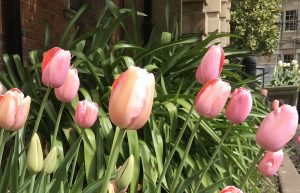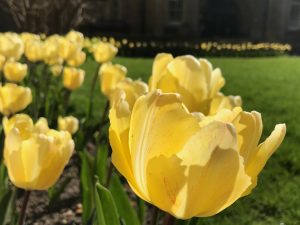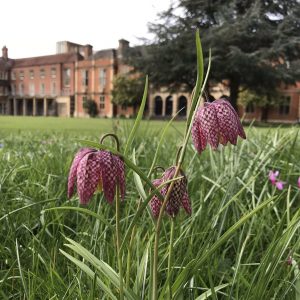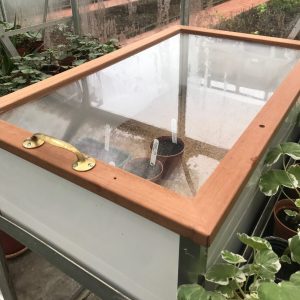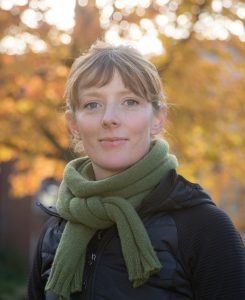It would be an understatement to say it has been a strange spring so far – but the bulbs are giving it their all at the moment anyway.
As the daffodils and hyacinths fade, the tulips take the limelight. The dazzling display of tulips at Somerville begins in late March and continues through to May – a riot of colour that my colleague Dave has been developing over many years.
Snake’s head fritillaries have emerged too, delighting all who spot them on the library lawn. Those students who are unable to return home are still staying on site, and I hope that they can enjoy some respite from all this amongst the spring spectacle.
During the shutdown, I will be mostly working from home. This might sound like a problem for a gardener, but it has been a great opportunity to look through images of the gardens past and present, reflect on developments, and set out what I wish to achieve in the future.
As circumstances have changed so significantly, my plans may be slower to evolve than I previously imagined – but I’m hopeful that Dave and I can make some positive changes to the gardens when things begin to return to normality, even with more limited means.
While the gardens at Somerville continue to grow on unperturbed by current events, another crisis that has been affecting them is global climate change. Both public and private gardens are recording flowers appearing earlier and earlier each year, so we are going to record flowering times too to see how this varies over the years.
It’s important that we all do anything we can to reduce our impact on the environment. Peat extraction is a process that removes both a natural carbon sink and a precious resource that takes many years to form, and horticulture is one of the industries driving this unnecessary extraction.
We are excited that we will now be using peat-free compost for seed sowing and potting up the seedlings that were started in earlier in the year. Peat-free composts have improved dramatically in the last few years, and we are using Melcourt’s Sylvagrow all-purpose peat-free growing medium with added John Innes. We’re pleased with the results so far, and happy to be making the gardens more sustainable.
Growing from seed is going to be crucial for us going forward. Seeds are inexpensive and allow you to produce plants in large quantities. We are lucky to have a fantastic growing area in front of the Margery Fry building, with cold frames, a potting shed, three good-sized beds, and a heated glasshouse with plenty of bench space. It is in the glasshouse that most of our plants will begin their lives, starting in the propagating unit (see photo below) with heated cables under sand to promote speedy germination.
In your own garden, now is a great time for sowing seeds indoors in pots, and outdoors directly into the soil. A fantastic resource for growing advice is the Royal Horticultural Society website (and their publications) www.rhs.org.uk/advice, you can always reach out to me or various horticultural experts on social media. Just get in touch if you’d like recommendations of people to follow on Twitter and Instagram for gardening advice and inspiration.
Instagram: sophie.gardens
Twitter: sophie_gardens
